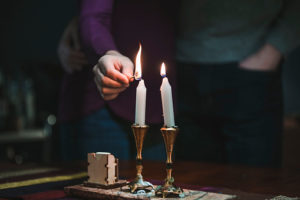
With the phrase “Jewish Standard Time” — which suggests a (stereotyped) propensity to show up to an event 15 minutes late — Jews have long been the butt of jokes about being on our own timeline.
With the introduction of a congressional bill to make daylight saving time permanent, Orthodox Jews are pushing back, and jokes about Jewish time being different from secular schedules suddenly have a great deal of truth to them.
On March 15, the Senate passed the Sunshine Protection Act, which, beginning in 2023, would end the biannual practice of changing one’s clocks twice a year and instead make DST a year-round affair. Supporters cite a reduction in seasonal depression and more sunlight in the evening to allow children to safely play outside as possible benefits of permanent DST.
The bill has yet to be voted on in the House of Representatives, and President Joe Biden has not publicly voiced support for it.
The Orthodox Jewish Congregations of America, or Orthodox Union, and Rabbinical Council of America, however, have been swift in voicing dissent.
A March 21 letter from the OU Advocacy Center to the House argued that permanent DST would force children to wait outside for a school bus or commute to school in the dark; year-round DST has adverse effects on sleep, the letter argued.
Nathan Diament, the OU executive director of Public Policy and Advocacy, argued that the greatest adverse effect on Jewish communities would be on the later shift in prayer times needed to accommodate DST.
“If you observe the halachot that say, you can’t say the morning prayers until after sunrise, that’s potentially very disruptive in terms of people that need to get to work, and so on,” he said.
In places such as Cleveland and Cincinnati, close to the Central and Eastern time zone, sunrise may not be until 9 or 9:30 a.m., when employees may be required to be at their desks.
In Philadelphia, flush to the East Coast, the time change is not as drastic. For Rabbi Nesanel Cadle of Knesset Hasefer of Yardley, the change would be possible, but unwelcome.
“I’m not going to go protest or something, but it is a substantial inconvenience for the frum community,” he said. “Obviously, that wasn’t something that the government are clued into, and I don’t know what can be done about it.”
On Shabbat, DST is a “plus” for Cadle and his congregants, as a later start time means less rushing home from work early to prepare for the Sabbath.
In the summer, however, Shabbat would not start until after 8 p.m. some nights, a deterrent for congregants with younger family members from being a guest at Shabbat dinners.
“It would just be too late for most of the people,” Cadle said.
The genesis of Jewish discord with the secular calendar comes from the tradition of following a Jewish calendar, which conceives of time a little differently than secular calendars, said Rabbi Michael Davies of Congregation Sons of Israel in Cherry Hill, New Jersey.
“We deal with a 24-hour day where it’s broken down into 24 hours, 60 minutes, etc.,” Davies said. “In the Jewish context, we actually divide the day into day and night, specifically, meaning it’s still going to be 24 hours, but in a day, light and dark are actually the break-ups.”
Within each delineation of day and night, there can be essentially 12 additional equal divisions, Davies explains, similar to hours, that determine when certain halachic activities must be fulfilled.
When days are shorter, an “hour” of Jewish day time could be as little as 50 or 55 minutes, rather than the full 60 minutes. Conversely, on longer nights, a Jewish “hour” could be longer than 60 minutes.
A form of Jewish DST also takes place in Israel, where the strategic time changes after Purim and before Yom Kippur to shave an hour off fasting days.
As a solution to secular timing woes in the U.S., OU proposed permanent standard time, which proponents argue is better for one’s circadian rhythm, and would eliminate the dangers of early-morning commutes.
On an individual level, there are a few leniencies Jews are willing to take to dodge the brunt of DST’s inconveniences.
According to Davies, Jews — depending on their denomination and comfort in bending the rules — can start morning prayers or light Shabbat candles half an hour early or start evening prayers a little later.
“You can’t take it that much earlier,” Davies said. “There’s a certain particular time that’s referenced as the earliest time one can take in Shabbat because it has to be, in some form or fashion, already the evening.”
But why bother with the technicalities at all? Saying prayers and completing rituals at specific times fulfill mitzvot, which is said by rabbis to have soul-elevating qualities. Whether saying prayers a few minutes earlier or later than required is less soul-elevating is partly up to the individual, Davies said.
But Jewish ritual and spirituality is, on some level, inextricable from the functional components of prayer: “There’s a practical element that we understand — again, we don’t fully understand how it connects — but we believe it connects to that soul-elevating factor through following the structures and the strictures of the halachic process.”






